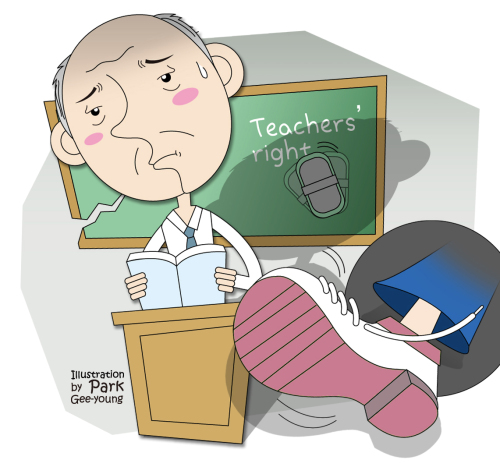
A third grade student at a middle school in Daegu hit his vice principal in the head and stomach several times on Nov. 1 because he confiscated his cigarette.
On the same day, the father of a sixth grade elementary school student in Gwangju threw a chair at his daughter’s homeroom teacher after he was dissatisfied with the way the teacher disciplined his child.
The two cases are the latest incidents in which students or parents have attacked teachers, and such cases are increasing and getting more violent.
The number of reported cases in which students or parents used violence against teachers has increased 1.5 times from 179 cases in 2006 to 260 cases in 2010, according to the Korean Federation of Teachers’ Association.
However, experts say that the number may be higher, as schools try to hush up such cases to protect their image.
“The reason why every case is not disclosed to the outside is because schools do not want to see their reputation damaged,” a middle school teacher in Siheung, Gyeonggi Province said on condition of anonymity.
“A fellow teacher at my previous school ordered a female student not to wear makeup at school, and her parents got angry at the instruction. They made a disturbance, beating the teacher, but she had to apologize to the parents because the school didn’t want the incident to be known to outsiders including the media,” she said.
The cases reported by the media are extreme ones, and “minor” incidents such as cursing at teachers or the obstruction of class are routine, she added.
The weakening of teachers’ authority is attributed to different factors, depending on the political inclination of observers.
On the conservative side, the Korean Federation of Teachers’ Association points to the ordinance banning corporal punishment.
“The recent decree adopted by the Gyeonggi and Jeolla provincial education offices bans teachers from inflicting corporal punishment on students, and also gives students more leeway over school affairs. That’s the root cause for teachers’ authority being trampled on,” said Shin Jeong-ki, director of the teachers’ authority department of the KFTA.
“As teachers are banned from punishing students physically, we have no alternative tool to put students’ deviation under control. Certainly, the current penalty point system, which replaced corporal punishment, does not work,” said the teacher in Siheung.
The system, created as a substitute for physical punishment, is too “weak” to empower teachers to keep order, according to the teacher.
“It also takes a long time for students to reach the maximum points of 30 to 40 where teachers are allowed to punish students. If a student obstructs a class once, 2 points are given. Worse still, students prefer punishment in the form of cleaning the school or doing volunteer work since they don’t have to come to class,” she added.
The conservative group of teachers regards the penalty points as useless, and is pushing for tougher punishment against students challenging teachers’ authority. It calls for suspension, transferring students to another school, strengthening support for teachers and running consulting programs for students with behavior problems.
On the other side of the coin, advocates for the new ordinance argue it is students’ rights, not teachers’ authority, that have been downtrodden.
“We don’t think strong discipline will work because it’s not that students nowadays will follow a teacher’s order because he or she can impose sanctions on them,” said Park Jong-chul, director of student life of the Korean Teachers and Education Workers’ Union.
According to him, student behavior turned remarkably aggressive as education started to be treated as a market in the late 1990s. As a result of the market economy view, teachers were degraded into suppliers of knowledge, with students and parents regarded as consumers of knowledge.
“Such perception has led to the collapse of teachers’ authority,” he said. “Furthermore, students of today have a totally different attitude toward school life. Teachers cannot force their outdated rules and discipline upon them.”
Some teachers take the change in teachers’ authority and students’ human rights as a natural development.
“I think we are in transition as teachers, students and parents are learning how to respect one another in a new way and adjusting to find the common ground,” said Kim Jin-young, a third grade teacher at Osan Middle School in Osan, Gyeonggi Province. In the old days, teachers’ authority had been much more powerful than that of students’ rights, she added.
Students’ rights are as important as teachers’ authority, but both sides should keep in mind that their rights or authority can be protected when they respect each other, Kim said.
“Whenever campus violence shocks the nation, the public easily blames a teacher-student relationship gone awry,” she said.
But the government and society are responsible as they have failed to supplement the shortcomings of the western education system when they adopted the ban on corporal punishment in Korean schools, she added.
By Lee Woo-young (wylee@heraldcorp.com)
-
Articles by Korea Herald







![[KH Explains] No more 'Michael' at Kakao Games](http://res.heraldm.com/phpwas/restmb_idxmake.php?idx=644&simg=/content/image/2024/04/28/20240428050183_0.jpg&u=20240428180321)

![[Weekender] How DDP emerged as an icon of Seoul](http://res.heraldm.com/phpwas/restmb_idxmake.php?idx=644&simg=/content/image/2024/04/25/20240425050915_0.jpg&u=)








![[Herald Interview] Mistakes turn into blessings in street performance, director says](http://res.heraldm.com/phpwas/restmb_idxmake.php?idx=652&simg=/content/image/2024/04/28/20240428050150_0.jpg&u=20240428174656)
